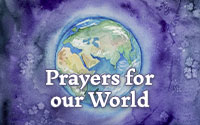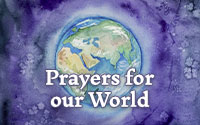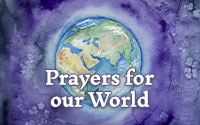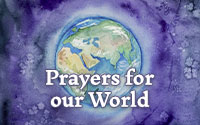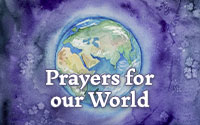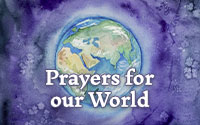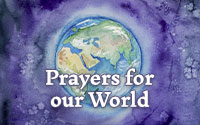Bosnia: Prayer for the Church
Churches Led by the Holy Spirit - Before Jesus went up to heaven, he told his disciples to wait in Jerusalem for the promise of the Father - the Holy Spirit. They did, and it was by the power of the Spirit that the very first movement to Christ began. 3,000 were baptized in one day, with believers added daily.
Again and again throughout the book of Acts we see the Holy Spirit initiating, empowering, and leading the early church. By the Holy Spirit, the disciples proclaimed the gospel fearlessly. They were empowered by the Spirit to speak boldly in the face of imprisonment, courts, opposition, and even death. Yes, and it was through the leading of the Holy Spirit that the church sent out the first people to take the gospel where it was not known.
Likewise, as we pray for a movement in Bosnia of disciples making disciples, we long to see churches following that very first model of being led by the Holy Spirit.
But you will receive power when the Holy Spirit has come upon you, and you will be my witnesses in Jerusalem and in all Judea and Samaria, and to the end of the earth. Acts 1:8 Going Before the Father:
- Pray for the Holy Spirit to stir and convict souls in this nation— and that the result would be commitment to Christ.
- Pray for those who know Christ and those who will soon come to him, that they will live empowered and emboldened by the Spirit in their daily lives.
- Pray that obedience to the Holy Spirit would be central to new churches as they form.
Afghanistan: Women Activists Fear Return Of Repressions
Khalida Khorsand, a 35-year-old rights activist from the western Afghan city of Herat, is skeptical about Taliban claims that it has dispensed with its strict rules against girls' education and women working.
The militant Islamic group made the declaration in the midst of recent peace talks with U.S. envoy Zalmay Khalilzad aimed at bringing an end to the long U.S. military presence in Afghanistan.
But Khorsand still remembers the notorious repressions under Taliban rule as a teenager in the western city of Herat when she risked the death penalty to study literature in a class disguised as a women's sewing group.
"After nearly 18 years without the Taliban in power, we now see that the Taliban are coming back in Afghanistan and there haven't been big changes for women's lives -- especially in rural areas," says Khorsand, who has dedicated much of her life since 2001 to advancing women's rights in western Afghanistan.
Even without the Taliban in power in Herat, Khorsand says, many hard-fought gains for women since the collapse of the Taliban regime already are under threat.
She attributes that situation to what she calls "a Taliban way of thinking" by many Afghans and a proliferation of unregistered religious schools in Herat teaching "radical Islam" to as many as 50,000 young people.
If the Taliban gets a role in the Afghan government as part of a peace deal, as Khorsand expects, she fears a floodgate will be opened for resurgent "radical Islamists" in Herat.
"I don't know why this has been allowed to happen under the current government of Afghanistan since 2014," Khorsand laments. "They are not paying attention to the rise of fundamentalists and radical groups in Herat.
"Now the city has become a safe haven for the radical groups that support the ideology of the Taliban," Khorsand says. "The fundamentalist groups in Herat are very organized and have a lot of money. They take the young people into madrasahs and teach to them the principles of the Taliban, and they are having an enormous impact on the young generation."
Those groups already have gained backing from municipal authorities for an unofficial ban on live musical performances in Herat and for a ban on celebrating Valentine's Day -- with both practices being declared "unIslamic."
In rural areas of Herat Province, where Khorsand worked for years to help women who are victims of domestic violence, Khorsand says she has seen disturbing signs of support for the punishments doled out by the Taliban under its strict enforcement of Islamic Shari'a law -- amputating the hands of thieves, publicly flogging people for drinking alcohol, and stoning to death those who engage in adultery.
Students at Herat's madrasahs deny being radical Islamists. But they also support a return to the prohibitions and punishments of the Taliban era.
"Allah says cut off the hands of a male thief and a female thief," says Jan Agha Jami, a 21-year-old at the Fakhr al-Madares madrasah in Herat. "When men and women commit adultery, whip them if they are single. If they are married, they should be stoned, and the Koran's rulings should be implemented in public.
"Music concerts are absurd because they are forbidden," Jami tells RFE/RL. "Music is bad for the mind, memory, and even human psyche. When a girl performs in front of strangers, the whole society is corrupted."
Reflecting on the growing popularity of such beliefs in Herat, Khorsand says "it makes no difference for women in Afghanistan if the Taliban exists or doesn't exist."
"The Taliban's way of thinking about women is the way many people are thinking in Afghanistan," she says. "A lot of Afghans have traditional ways of thinking and they believe the talk of the Taliban. Unfortunately, much of their way of thinking is against the rights of women."
Move Forward, Step Back
To be sure, Khorsand says there have been important advances for Afghan women since 2001 -- including language in the Afghan Constitution that enshrines the right to education and to work.
Women are members of parliament and can be seen on television, competing in sports, and performing in concerts in Kabul.
But the Afghan government since the collapse of the Taliban regime has included many conservative Islamists and former warlords whose attitudes about women are similar to the Taliban.
Sima Simar, the head of Afghanistan's Independent Human Rights Commission, says the gains for women since 2001 can easily be overturned and have rarely been implemented in rural areas where most Afghans live.
The 2018 Women, Peace, and Security Index by Georgetown University and the Peace Research Institute of Oslo ranks Afghanistan as the second-worst place in the world to be a woman. Only Syria was ranked worse.
That study notes that only 16 percent of Afghanistan's workforce is female and that half of all Afghan women have four years or less of education.
UNICEF, the United Nations children's agency, says only half of school-aged Afghan girls now go to school, and that only one out of five girls under 15 are literate.
Nearly two out of three Afghan girls are married when they are teenagers or younger. On average, they are sent by their parents into arranged marriages between the ages of 15 and 16.
Most imprisoned Afghan women have been jailed for so-called "morality crimes," such as leaving an abusive husband or demanding to marry a man of their own choosing.
Pray: That the steady advances being made towards improving womens rights will not be overturned.
Pray: That boys and girls will get equal access to good education, especially in the rural areas.
Pray: For improved employment opportunities for women.
Pray: For those who work with and speak up for the oppressed women and children in Afghan society - that their voice will be heard and acted upon.
Iran Threatens To Resume High-Level Uranium Enrichment Amid U.S. Sanctions
Iran's president said the Islamic republic will resume high-level enrichment of uranium if world powers do not protect its interests against U.S. sanctions.
Hassan Rohani's address to the nation was aired by state television on May 8, the anniversary of President Donald Trump's decision to withdraw the United States from a landmark nuclear agreement.
The announcement further escalates tensions between Tehran and Western nations -- first and foremost, the United States, which this week said it was deploying an aircraft carrier battle group to waters near Iran.
Rohani said the remaining signatories of the 2015 accord -- Britain, France, Germany, China, and Russia – had 60 days to take measures to protect Iran's oil and banking sectors.
Western officials reacted cautiously to Rohani's announcement.
In London, U.S. Secretary of State Mike Pompeo, speaking alongside British Foreign Secretary Jeremy Hunt, said Washington will wait to see if Tehran follows through on its threats before deciding its next move.
The White House, meanwhile, announced new economic sanctions targeting Iran's steel, copper, aluminum, and mining sectors, all key sources of revenue for the country.
"Tehran can expect further actions unless it fundamentally alters its conduct," Trump said in a statement released by the White House. "I look forward to someday meeting with the leaders of Iran in order to work out an agreement and, very importantly, taking steps to give Iran the future it deserves."
In his speech, Rohani said Iran will start reducing some of its commitments under the 2015 nuclear deal and will no longer export enriched uranium and heavy water to other nations as stipulated in the accord.
He said Iran would begin to build up its stockpiles of low enriched uranium and of heavy water, which is used in nuclear reactors, including a reactor that could produce weapons-grade plutonium.
If the Europeans fail to compensate for the unilateral American sanctions, he said, Iran will resume construction of the Arak nuclear reactor, a facility that was shut down, and its key components dismantled.
"If the five countries join negotiations and help Iran to reach its benefits in the fields of oil and banking, Iran will return to its commitments according to the nuclear deal," Rohani said.
However, Rohani warned of a "strong reaction" if European leaders instead sought to impose more sanctions. He did not elaborate.
Iranian Foreign Minister Mohammad Javad Zarif also tweeted: "After a year of patience, Iran stops measures that [the United States] has made impossible to continue."
Other European signatories of the deal urged Iran to uphold the nuclear pact and said they want to keep the Iran deal alive.
French Defense Minister Florence Parly warned that if Iran did not keep its commitments, re-imposing sanctions would be considered.
In Berlin, the office of German Chancellor Angela Merkel said: "We as Europeans, as Germans, will play our part and we expect full implementation from Iran as well.”
At his news conference with Pompeo, Hunt said that Iran's threat to resume higher enrichment of uranium is an "unwelcome step" and urged Tehran to adhere to the deal.
Russia, meanwhile, has blamed the United States for the crisis, a point Foreign Minister Sergei Lavrov repeated during a news conference in Moscow with Zarif.
“The U.S. is to blame for the situation and it makes it difficult for both Iran to fulfill its obligations and...for the general state of the nuclear nonproliferation regime,” Lavrov said.
Zarif insisted that Iran's latest decision did not violate the agreement, and asserted it was provoked by U.S. actions toward Iran. He said Iran will uphold its obligations if European signatories to the deal uphold theirs.
China, which was also a signatory to the deal, said maintaining and implementing "the comprehensive agreement is the shared responsibility of all parties.”
"We call on all relevant parties to exercise restraint, strengthen dialogue, and avoid escalating tensions," said Chinese Foreign Ministry spokesman Geng Shuang.
The 2015 nuclear pact, known as the Joint Comprehensive Plan of Action, lifted crippling economic sanctions in exchange for Tehran agreeing to curb parts of its nuclear program.
Last year, Trump announced the U.S. pullout, arguing it was flawed because it did not include curbs on Iran’s development of ballistic missiles or Tehran’s support for proxies in the Middle East.
Washington also reinstated sweeping sanctions that have badly hit the Iranian economy.
Despite the U.S. moves, Tehran has continued to comply with the terms of the deal, according to the International Atomic Energy Agency.
European backers of the deal have been trying to salvage the agreement, but Tehran has complained that the process is too slow.
Last month, the U.S. administration announced it would not permit importers of Iranian oil to buy it without facing U.S. sanctions. Oil exports are a major source of revenue for the Iranian economy.
On May 8, Tim Morrison, Trump's special envoy on weapons of mass destruction, threatened that the United States was ready to impose more sanctions "very soon" and warned European nations against doing business with Tehran.
With reporting by the AP, Reuters, BBC, and AFP
More: https://www.rferl.org/a/iran-to-reduce-commiments-to-to-nuclear-deal/29928087.html?ltflags=mailer
Pray: that the disagreement will not lead to nuclear proliferation
Pray: for the ordinary Iranian citizens affected by the economic sanctions
Pray: that Iran will comply fully with the nuclear deal
Burkina Faso: 6 killed for following Jesus
THEY REFUSED TO DENOUNCE JESUS — PASTOR, 5 OTHERS SHOT AFTER CHURCH SERVICE IN BURKINA FASO
Last Sunday seemed like any Sunday for 80-year-old Pastor Pierre OuIt, who has spent 40 years serving his church and Sirgadji village community in the northeastern Soum province of Burkina Faso. On April 28, he gathered for worship with his congregation in the West African country. And like every Sunday, he preached the Word of God with the wisdom that seasoned years of life and ministry bring.
But shortly after the service, an ordinary Sunday suddenly turned deadly and a church building where worshippers had just gathered became a crime scene.
KILLED FOR FOLLOWING JESUS
At about 1 pm, while Pastor Pierre was still talking with several congregants in the churchyard, a dozen men on motorbikes stormed the area.
A local leader who wished to remain anonymous told World Watch Monitor: “The assailants asked the Christians to convert to Islam, but the pastor and the others refused.”
Reportedly, the attackers gathered Pastor Pierre and the five other congregants under a tree and then confiscated their Bibles and cell phones.
“Then they called them, one after the other, behind the church building where they shot them dead,” the leader said.
In addition to Pastor Pierre, the attackers killed his son, Wend-Kuni, and his brother-in-law (a church deacon), Zoéyandé Sawadogo, as well as believers Sayouba and Arouna Sawadogo, and a primary school teacher, Elie Boena. Another was seriously injured and taken to a nearby hospital.
The men then set the church building and two motorbikes on fire. Before they left, they stole sheep and a bag of rice from Pastor Pierre’s home.
He and his five congregants were buried the same day in a ceremony that drew people from both Christian and Muslim communities. The pastor leaves behind his wife and six other children.
Other locals reported that the next day, the same attackers (some of them known to village residents as “young men who’ve been radicalized”) came back into the village “searching for Christians.”
The sources say the armed groups can move with impunity because of the lack of law enforcement in the area in the West African country.
“I WOULD RATHER DIE THAN LEAVE”
Previously, Pastor Pierre told relatives about his concerns over the deterioration of security in the region, though there had been no incidents in his village.
The community leader said that when he and others advised the pastor to leave the area, he refused, saying he “would rather die for his faith than leave the community he has been serving for 40 years.”
In the last few months, more than 100 Christians have fled the area, moving farther south, more than 46 miles away. In February, armed men believed to be Islamist militants killed a church leader in the southeast region of Nohao, as he was returning from Togo.
Last Sunday’s violence in Burkina Faso that took the life of Pastor Pierre and his five congregants appears to have been the first attack, specifically on a church building, in which believers in Burkina Faso have been killed by Islamist extremists.
Pray: for the families of the martyrs, that they will have the grace to forgive the attackers.
Pray: for protection of Christians facing persecution daily, around the world.
Pray: for the attackers to be brought to justice.
May 7, 2019 by Lindy Lowry


